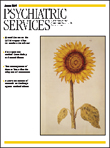In Reply: We agree with Dr. Hellman's assertion that the problem of disparities in mental health services for lesbian, gay, bisexual, and transgender (LGBT) people is widespread. We are also frustrated that as federal and state governments increasingly mandate culturally relevant care, political efforts have sought to limit services for and research regarding the health and mental health of sexual and gender minorities—a move which can only intensify existing inequities.
We find that conducting in-depth research among segments of the LGBT population offers concrete examples of how LGBT individuals are subjected to disparities. This concentrated view can challenge dominant notions of the "LGBT experience" and help determine the compounding factors that prevent LGBT individuals from obtaining high-quality mental health care. Similarly, Hellman (
1,
2 ) and Lucksted (
3 ) have cast critical attention upon the unique needs of individuals with serious mental illness, who constitute a stigmatized, underserved, and neglected segment of the broader LGBT population.
Our research involving 38 rural and 38 urban New Mexicans points to important commonalities in their help-seeking narratives, such as lack of insurance and financial resources, limited access to LGBT-friendly services, and homophobic-transphobic encounters in treatment settings. Nevertheless, our ongoing analysis of these narratives suggests that disparities associated with rural life in New Mexico make it even harder for rural LGBT individuals to access mental health care either from specialty providers or in informal settings. The most obvious example is that some 80 percent of psychiatrists, 70 percent of psychologists, 47 percent of social workers, and 53 percent of mental health counselors are based in New Mexico's two largest urban centers (
4 ). Rural LGBT people are thus greatly restricted in both access to basic services and the ability to choose their providers.
Another difference worth noting is the isolation that rural LGBT people feel from informal mental health resources. Compared with their urban counterparts, rural LGBT people have substantially less access to LGBT-friendly environments, including religion-based social networks, other community support systems, and LGBT-specific support groups, organizations, and help-lines. This isolation is exacerbated by conditions of poverty and complicates the already difficult living situations of many LGBT people who seek help for mental health issues. Such difficulties were tackled in the seminal article on mental health care for rural LGBT people almost two decades ago (
5 ), and we find that they continue to occur unabated.
We advocate for research and reform that attends to all LGBT people but that also considers the context-specific reality of rural LGBT individuals who, much like people with serious mental illness, experience extensive stigmatization and are an underserved and neglected segment of a larger population. Voices of rural LGBT people—and of rural residents in general—are not typically represented in mainstream mental health literature. The narratives of our rural LGBT participants reinforce the efforts of other researchers and demonstrate that the barriers to culturally relevant services discussed by Dr. Hellman in his 1996
Psychiatric Services article (
2 ) remain salient today. And, as he concluded in that article, "A change in attitudes and practice is overdue." We might add that such a change now is disturbingly long overdue.

